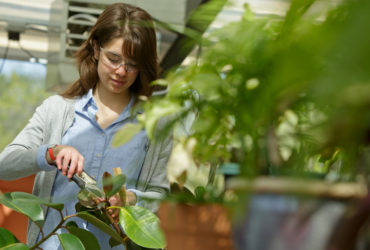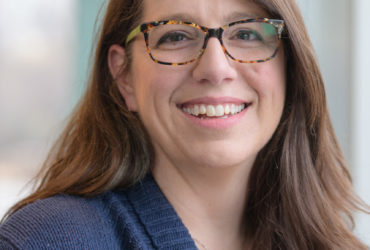
Every year, tens of thousands of Americans get sick from diseases passed between animals and people, according to the Centers for Disease Control. As human and animal populations continue to coexist in ever closer settings, understanding how their lives connect to each other — and to their shared environments — is critical.
One Health is a burgeoning, interdisciplinary field that recognizes the close relationship between the health of people and the health of animals, plants and the environment. Although One Health is not new, it has grown more important in recent years due to factors such as climate change and increases in international travel and trade, which enable diseases to spread quickly around the globe.
Fontbonne’s One Health degree is one of the first undergraduate programs of its kind in the United States. It was developed in partnership with the Saint Louis Zoo’s Institute for Conservation Medicine in order to help prepare students to solve the most pressing planetary health problems.
“We developed Fontbonne’s One Health program because we recognized the need to train students to adopt a more holistic approach, acknowledging that human, animal and environmental health are three facets of the same issue,” said Dr. Kelly Lane-deGraaf, Fontbonne biological and physical sciences professor and recent recipient of the Academy of Science – St. Louis 2020 Outstanding Science Educator Award. “Students must learn to act and think in a global way, not in disciplinary silos.”

Students can choose to pursue a bachelor’s degree or a minor in One Health. Both offer an interdisciplinary curriculum that includes courses in biological sciences, communications, ethics, policy, culture and social justice. This diverse program of study prepares students for a wide variety of human, animal, or environmental health professions.
“Because One Health is such a multisectoral field, there is an abundance of career options that fit the varied interests of our students,” Lane-deGraaf said. “Not only have graduates gone to medical and veterinary school, but they’ve also become public health practitioners, ecologists, and even science writers. For many students, it has opened doors to jobs they didn’t know existed.”
In addition to rigorous coursework, Fontbonne faculty provide students with numerous internship and research opportunities that investigate cutting-edge science, address social justice issues, teach experiential learning and more. Students in Lane-deGraaf’s lab, for example, participate in research that examines how human actions shape wildlife population dynamics in urban raccoons.
“Students engage in all facets of research at Fontbonne, from experimental design to data collection to presentations of their results,” Lane-deGraaf said. “Most graduate as co-authors of a manuscript in review.”
Small class sizes also provide Fontbonne’s One Health students with unique opportunities to work closely with faculty members. Recently, several students were able to co-author case studies in a textbook published by Lane-deGraaf, along with Drs. Sharon Deem and Elizabeth Rayhel. The textbook — An Introduction to One Health: An Interdisciplinary Approach to Planetary Health — highlights student work and is the only One Health textbook currently available for undergraduates.
“Fontbonne’s One Health program is unique, giving students immersive opportunities they might not be able to find anywhere else,” Lane-deGraaf said.
More information about Fontbonne’s One Health program can be found on the Biological and Behavioral Sciences Department website. To apply, contact Jenny Chism, Fontbonne’s Director of Admission, at jchism@fontbonne.edu or 314-889-1400.

